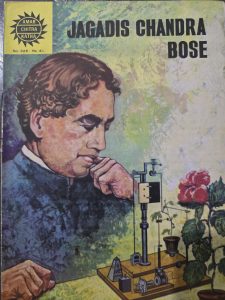
3994 - Jagadis Chandra Bose
Author: Amar Chitra Katha
This book offers an insightful biography of Jagadis Chandra Bose, the pioneering Indian scientist who made groundbreaking contributions to plant physiology, physics, and radio science. It traces his journey from a curious child in colonial India to a world-renowned innovator who challenged the scientific norms of his time. Bose is celebrated for proving that plants have life and response systems, and for being a forerunner in the development of wireless communication—predating even Marconi in some experiments. Written in an accessible style, the book blends science, history, and biography, shedding light on Bose’s deep respect for both Eastern philosophy and Western science. It emphasizes his struggles against colonial prejudice, his commitment to original research, and his belief in using science for the betterment of humanity. Keywords: Jagadis Chandra Bose, Indian scientist, Plant physiology, Wireless communication, Radio waves Biophysics, Colonial India, Scientific discovery, Pioneer, Innovation, Experimental science, Plant consciousness, Electromagnetic waves, Bose Institute, Science and spirituality, History of science, Scientific racism, Botany, Physics, Inspiration, Ideal For: Students and Young Readers – especially those studying science, biographies, or Indian history; it introduces them to a pioneering figure in a relatable and inspiring way. Science Enthusiasts – readers interested in the origins of wireless communication, plant physiology, and scientific breakthroughs from non-Western scientists. Educators – as a resource to teach about contributions of Indian scientists and to broaden the global perspective in science curricula. History Buffs – especially those focused on colonial India, scientific nationalism, and the global evolution of science during the 19th and 20th centuries. Motivational and Inspirational Reading – showcasing perseverance, curiosity, and innovation in the face of adversity. Library and School Collections – suitable for inclusion in sections on biography, science, or Indian heritage. Age: Recommended Age Group 18 years and older (undergraduates, graduate students, researchers) Well-suited for advanced high-school students (16+) with strong interest in botany, biophysics, or history of science. Theme: 1. Scientific Inquiry and Innovation The book highlights Bose’s relentless pursuit of knowledge through experimental science, especially in plant physiology and wireless communication. It emphasizes the power of curiosity, observation, and empirical research. 2. Unity of Life One of Bose’s most groundbreaking ideas was that plants, like animals, respond to stimuli, suggesting a continuity or unity in life forms. The theme reflects a blend of science and philosophy, often inspired by Eastern spiritual thought. 3. Perseverance Against Colonial Barriers The biography often explores how Bose faced racial discrimination and institutional bias under British rule but persisted, breaking through scientific and cultural limitations to earn global respect. This makes resilience and self-belief key themes. 4. Integration of East and West Bose’s life and work bridge Eastern philosophies with Western scientific methodologies, promoting a theme of cultural synthesis and intellectual harmony. 5. Science for the Betterment of Humanity He believed that scientific discoveries should serve human progress and not just technological gain or colonial power, stressing ethical science and universal upliftment. Tone: 1. Scholarly and Analytical In Bose’s original scientific works (like Plant Response or Comparative Electro-physiology), the tone is formal, precise, and data-driven, focused on detailed experimentation, logic, and scientific observation. 2. Inspirational and Respectful (in biographical versions) In biographies or narrative books about his life: The tone is often inspirational, celebrating his intellect, perseverance, and contributions. It is also reverent, portraying him as a visionary who combined science with spiritual insight. 3. Reflective and Thought-Provoking The narrative often encourages readers to think deeply about nature, the unity of life, and the role of science in society. Bose’s own philosophical views make the tone introspective at times. 4. Assertive and Defiant (in context of colonial struggles) When covering his struggles under British colonial rule, the tone may turn firm and defiant, emphasizing justice, dignity, and equality—especially in overcoming racial prejudice in the scientific world. Book Type: The book type of Jagadis Chandra Bose depends on which version you're referring to. Here's a breakdown by category: 1. Biographical Version (e.g., NBT, Scholastic, Amar Chitra Katha) Book Type: Biography / Non-Fiction Genre: Scientific Biography, Inspirational Literature Audience: General readers, students, young adults Purpose: To narrate the life, struggles, and achievements of Jagadis Chandra Bose in an accessible way 2. Original Scientific Works by Jagadis Chandra Bose Book Type: Scientific Treatise / Academic Non-Fiction Genre: Science (Botany, Physics, Biophysics) Audience: Scholars, researchers, advanced science students Purpose: To present original experiments, observations, and scientific theories. Length: The Book "Jagdis Chandra Bose" Is Approximately 32 Pages Long.
